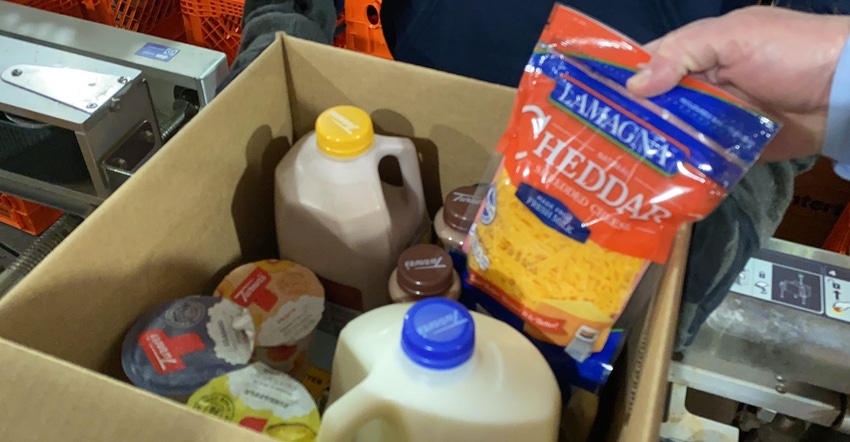USDA food box program delivers 5m boxes
First round of $1 billion in Farmers to Families Food Box Program funding ends June 30, with some contracts extended starting June 15.

The U.S. Department of Agriculture’s Farmers to Families Food Box Program has distributed more than 5 million food boxes in support of American farmers and families affected by the COVID-19 pandemic. During a virtual event on June 4 with Mississippi legislators and recipients, Agriculture Secretary Sonny Perdue called the program a win-win-win for farmers, distributors and those in need with a trifecta impact on the entire food supply chain.
USDA’s Farmers to Families Food Box Program partners with regional and local distributors -- whose workforces have been significantly affected by the closure of many restaurants, hotels and other foodservice entities -- to purchase $3 billion in fresh produce, dairy and meat and deliver boxes to Americans in need.
“The Farmers to Families Food Box Program was designed to put American farmers and distributors of all sizes back to work while supporting over-burdened food banks, community and faith-based organizations and other nonprofits serving Americans in need, and the program is doing just that,” Perdue said. “It’s encouraging to see the passion with which farmers, distributors and nonprofits have gone above and beyond to make this program work in support of the American people.”
Perdue noted that although it is a momentous milestone, this is only the beginning for the program. “With continued support we expect up to 40 million boxes will be delivered throughout the country by June 30,” he added.
Speaking on a call May 28 with Vermont participants in the program and Sen. Patrick Leahy (D., Vt.), Agriculture Marking Service (AMS) administrator Bruce Summers said the agency is “not taking our foot off the gas pedal” and reiterated that 40 million boxes remains the goal.
AMS is known for buying for federal feeding and school lunch programs, but the Farmers to Families Food Box Program represented a new way for USDA to provide timely support to farmers and families, Summers added. The initial project had three goals: (1) provide farmers and ranchers with a market to sell their food, (2) use the logistical expertise of food distributors and (3) help charitable organizations meet the food needs of people in their area.
During the June 4 call, Perdue was joined by Sen. Cindy Hyde-Smith (R., Miss.), Rep. Steven Palazzo (R., Miss.) and Mississippi commissioner of agriculture and commerce Andy Gipson to discuss the efforts in Mississippi.
Perdue said efforts similar to this usually take months, if not years, to materialize, yet Summers and his team at AMS were able to do it in a month. During the virtual event, Summers noted that the idea came from a motivated group of employees trying to bring to life Perdue’s motto since he started at USDA: Do right, and feed everyone.
Summers said the program is just the start, because more can be done. He said AMS is committed to running this program cost efficiently and effectively, with 100% U.S. products. He said the current contracts end June 30, but he’s excited about plans for the future and extending contracts.
Perdue said USDA will begin letting participants know by June 15 if contracts may be extended and also recognized that geographic areas potentially may have been missed in the initial round of contracts. “Our goal was to make sure the boxes were distributed widely across the United States. We didn’t hit the bull's-eye but will look at potential areas we missed in geographic dispersion,” Perdue said during the June 4 virtual event.
Andy Mercier, president and chief executive officer of Merchants Foodservice, said the program provided the type of relief needed to sustain the distributing company, which was forced to initially lay off 220 of the 900 employees it had before COVID-19 hit due to its clients in the K-12 and restaurant sectors being affected. Mercier praised the quick turnaround of the program as federal bids in the past sometimes take months. He said the Farmers to Families Food Box Program “sets a new precedent” in the speed and efficiency with which the government and private sector can work together.
Their contract calls for filling 398,000 food boxes for more than 109 delivery sites that service 200 agencies, with 70% being faith-based or community-based churches. “In the end, we realize we’re delivering more than just basic nutrition; we’re actually delivering hope,” Mercier said, adding that it shows to those who need help that someone is aware and cares about their plight.
Josh West, partner for West Group, also saw its two main customer bases – schools and restaurants – shut down. Because of being awarded contracts to deliver fruit and vegetable boxes in four states, the company did not have to lay off one person. He said from trucking partners to farmers, “we have seen the program impact people’s lives for the good.”
About the Author(s)
You May Also Like





